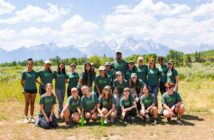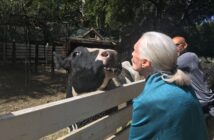Dr. Goodall’s research demonstrating that non-human animals are sentient, complex, intelligent, compassionate, and have innate value transformed human understanding of our relationship with the natural world. It also increased reverence and respect for the other beings with whom we share our planet. Through decades of advocacy on behalf of chimpanzees, worldwide wildlife, and animals in captive facilities, Dr. Goodall and JGI have fundamentally improved life for innumerable species. By supporting best-in-class care and practices for appropriate captive welfare in our model sanctuaries like Tchimpounga Chimpanzee Rehabilitation Center, by expanding and growing advocacy and partnerships to protect non-human animals, and by developing campaigns to improve public awareness and human behavior, JGI is delivering on a world that recognizes our place within—not above—the rest of the
animal kingdom.
As an essential part of that work, the Chimpanzee Welfare Index (CWI), developed by JGI’s Dr. Rebeca Atencia, executive director of JGI RoC, assesses factors like physical and mental health to assign a score to individual chimpanzees. That score and the underlying data then helps to establish individualized care plans and can facilitate the recognition of physical and psychological changes that may not be evident tto staff in daily observation, especially those changes that may happen slowly. In 2020, an additional feature was added to the welfare index database, which enables an automatic text message alert if there is any change to an individual’s body condition score. By using a standardized system,JGI Republic of Congo can identify concerns and measure improvement.
Tchimpounga’s staff has seen a 22% increase in welfare scores over the last four years. As of 2020, Tchimpounga chimpanzees were rated at an average of 97% on the CWI—a 4% increase from 2019. Realizing the significant success of the welfare index, Dr. Atencia is working to share the methods of Tchimpounga’s system of condition scoring and monitoring with other sanctuaries. Through the creation of a Great Ape Welfare Committee, Dr. Atencia has been working to create standardized welfare indicators for great apes in human care on a global level. The creation of a worldwide Great Ape Welfare Index will help sanctuaries and zoos better analyze and improve the general health and well-being of chimpanzees, gorillas, orangutans, and other primates being cared for by humans around the globe. The CWI is based on a Ph.D. thesis, ‘Great Ape Welfare Index,’ created by Australian primatologist Amanda Fernie.
ABOUT JGI’S TCHIMPOUNGA SANCTUARY + MAKE A DIFFERENCE FOR RESCUED CHIMPANZEES
Founded in 1992, the Jane Goodall Institute’s Tchimpounga Chimpanzee Rehabilitation Center is one of the largest chimpanzee sanctuaries in Africa, with nearly 140 rescued and rehabilitated chimpanzees. In the Republic of Congo, Tchimpounga serves as a beacon of hope, taking in orphaned chimpanzees rescued from the illegal pet or bushmeat trade. Through the expert care of the JGI staff and the generous support of people just like you, Tchimpounga is a second chance for chimpanzees who have suffered. You can support their care and help us keep our promise to never turn away a chimpanzee in need by becoming a Chimpanzee Guardian today.






